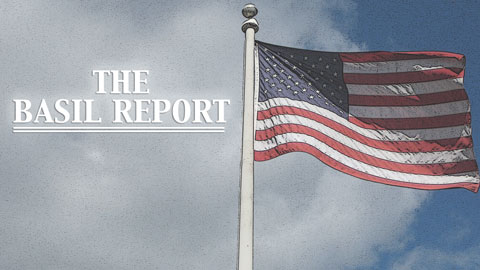Through advanced WSPN technology, I have received a Basil Report written by myself three months in the future. I have reproduced the column below:
When President Obama gave his State of the Union address back in January and called for investments in clean energy technology, little did he realize that such investments would be the country’s top priority only a couple of weeks later.
At the time of the State of the Union, Obama’s calls for green technology investment seemed like just another one of the speech’s feel-good proposals to help “win the future,” as Obama described it.
Even though the President was not very serious about prioritizing such investments – not nearly serious enough, as we now realize – newly empowered Republicans, along with politically-vulnerable Blue Dog Democrats, verbally ripped into even his pathetically meager proposal.
“These ‘investments,’ as the President calls them, include everything from solar shingles to high speed trains,” wrote Sarah Palin at the time. “The only thing these ‘investments’ will get us is a bullet train to bankruptcy.”
Since then, we’ve only seen just how wrong Palin and her fellow clean energy critics were.
The day before the President’s speech, Tunisia ousted its long-time dictator. Soon after, the revolution spread to the heart of the Arab world, Egypt. Even before Egyptian autocrat Hosni Mubarak was forced to flee Cairo in early February, protests began to flare elsewhere in the Middle East: demonstrators in Jordan, Yemen, and Syria were only the beginning.
We, of course, all know how it ended up. The Egyptian Revolution was to the Middle East what the fall of the Berlin Wall was to the Soviet Union. In the end, it was not the suicide bomber that brought down the Saudi Arabian monarchy; it was the unemployed college graduates who lit themselves on fire to protest corruption and oppression.
As Arab regimes are toppled left and right, and especially with the ongoing chaos in Saudi Arabia, oil prices have skyrocketed north of $200 a barrel and show no sign of falling any time soon. Economists fear that $6 a gallon gasoline is sending America back into recession.
Perhaps the worst part of this crisis is the knowledge that it completely, 100% could have been avoided. Congress is (still!) debating legislation to subsidize and support clean energy technology that will make the US completely energy independent.
Why didn’t Washington invest in clean energy before? Why, four decades after the first oil shock, hadn’t the US government forced a transition to a domestic, clean source of energy? Why, in January 2010, only weeks before the crisis, were mainstream politicians and American corporations doing everything in their power to prevent the government from weaning itself off its disastrous oil addiction?
If only we knew then what we know now. We could have – and should have – heeded the President’s call for clean energy investments before the crisis struck.






























